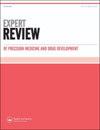Prognostic models to help predict patient responses to intravesical immunotherapy
IF 1.2
Q4 PHARMACOLOGY & PHARMACY
Expert Review of Precision Medicine and Drug Development
Pub Date : 2020-06-01
DOI:10.1080/23808993.2020.1768845
引用次数: 1
Abstract
ABSTRACT Introduction Approximately 30–60% of patients treated with Bacillus Calmette-Guérin (BCG) for non-muscle invasive bladder cancer (NMIBC) eventually experience disease recurrence within 2 years. Parsimonious use of BCG and accurate identification of those patients who might benefit from this therapy is of paramount importance in order to avoid BCG wastage, improve patient counseling regarding alternative therapy, patient’s survival and quality of life. We summarized the current literature on predictive and prognostic models on intravesical BCG therapy for NMIBC. Areas covered Clinicopathologic features are the strongest predictors of BCG response. In addition, several tissue, serum and urinary biomarkers have been investigated. However, they have not been shown to be robust enough to be implemented in daily clinical routine. Therefore, genetic and epigenetic markers and features of the tumor microenvironment have been investigated. The relationship between Th1 and Th2 microenvironments, as well as its related serum and urine biomarkers, was shown to play an important role in prediction of response to BCG treatment. Expert opinion No single tumor biomarker has been shown to be robust enough to change clinical decision making. Discoveries in the genetic signature profile of bladder cancer and immunological pathways represent the new frontiers in biomarker discovery and possible improvement in patient selection in the era of personalized medicine.预测患者膀胱内免疫治疗反应的预后模型
摘要简介大约30-60%的接受过卡氏杆菌(BCG)治疗的非肌肉浸润性癌症(NMIBC)患者最终会在2年内经历疾病复发。为了避免BCG浪费,改善患者对替代疗法的咨询,提高患者的生存率和生活质量,谨慎使用BCG并准确识别可能从该疗法中受益的患者至关重要。我们总结了目前关于BCG膀胱内治疗NMIBC的预测和预后模型的文献。涵盖的领域临床病理特征是BCG反应的最强预测因素。此外,还对一些组织、血清和尿液生物标志物进行了研究。然而,它们还没有被证明足够强大,可以在日常临床中实施。因此,对肿瘤微环境的遗传和表观遗传学标志物及其特征进行了研究。Th1和Th2微环境之间的关系,以及其相关的血清和尿液生物标志物,被证明在预测对BCG治疗的反应中发挥着重要作用。专家意见没有任何一种肿瘤生物标志物被证明足够强大,足以改变临床决策。膀胱癌症遗传特征图谱和免疫途径的发现代表了个性化医学时代生物标志物发现和患者选择可能改善的新领域。
本文章由计算机程序翻译,如有差异,请以英文原文为准。
求助全文
约1分钟内获得全文
求助全文
来源期刊

Expert Review of Precision Medicine and Drug Development
PHARMACOLOGY & PHARMACY-
CiteScore
2.30
自引率
0.00%
发文量
9
期刊介绍:
Expert Review of Precision Medicine and Drug Development publishes primarily review articles covering the development and clinical application of medicine to be used in a personalized therapy setting; in addition, the journal also publishes original research and commentary-style articles. In an era where medicine is recognizing that a one-size-fits-all approach is not always appropriate, it has become necessary to identify patients responsive to treatments and treat patient populations using a tailored approach. Areas covered include: Development and application of drugs targeted to specific genotypes and populations, as well as advanced diagnostic technologies and significant biomarkers that aid in this. Clinical trials and case studies within personalized therapy and drug development. Screening, prediction and prevention of disease, prediction of adverse events, treatment monitoring, effects of metabolomics and microbiomics on treatment. Secondary population research, genome-wide association studies, disease–gene association studies, personal genome technologies. Ethical and cost–benefit issues, the impact to healthcare and business infrastructure, and regulatory issues.
 求助内容:
求助内容: 应助结果提醒方式:
应助结果提醒方式:


